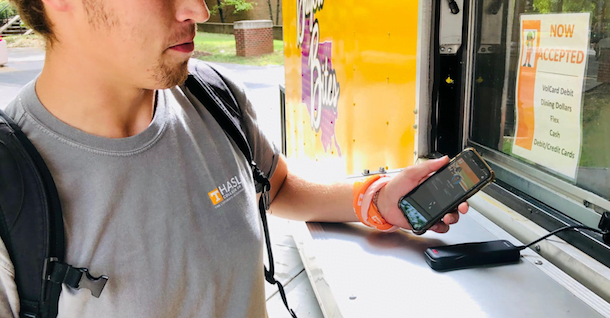
Campus food trucks have offered universities a creative means to diversify dining options for students, as well as provide students on the go with a more convenient meal between classes. So when the University of Tennessee, Knoxville was recently facing some food service challenges and was in need of a quick solution, card transaction system vendor, CBORD, stepped up with a food truck solution.
More specifically, Tennessee was facing an influx of students to campus, and it became evident that more cover in campus dining was needed.
“The labor shortage caused problems for the university. Combine that with a record enrollment, and it left us with some challenges that we needed to resolve quickly,” says Bill Strickland, Director of Operational Services, Division of Finance & Administration at the University of Tennessee, Knoxville. “When the fall semester began, Aramark didn’t have adequate labor to open all the eateries and the ones that were open were running on reduced staffing.”
The university turned to its card transaction system provider, CBORD, in an attempt to find a solution. The result of the planning with CBORD was a fleet of food trucks placed on campus.
“The food trucks drive onto the campus and can set up in high-traffic areas fairly easily,” says Sami Takieddine, Director of Platform Operations, Patron Engagement at CBORD.
Integral to Tennessee’s food truck offerings is the ability for students to leverage their campus cards and campus funds to pay for food. The payment options don’t end with the campus card, however.
“Students can pay by swiping their campus card or by tapping their Apple or Android phone and mobile credential. Students' declining balance funds on the Vol Card, dining or flex accounts are also accepted.”
“The food truck program was thrown together very quickly, but has been a huge success,” says Strickland. “Students can use their Dining Dollars to purchase food as well as cash or credit card.”
“Students have the option to pay either by swiping their campus card or by tapping their iPhone, Apple Watch or Android phone using their mobile credential,” says Takieddine. “Students can also opt to use declining balance funds associated with their Vol Card, dining or flex accounts.”
Joining Tennessee’s food truck initiative, the university is providing similar mobile alternatives for other student services.
“In addition to food trucks, we recently signed up a laundry truck to our UGryd program at UT-Knoxville with plans to add a second shortly,” says Takieddine. “These trucks will allow students to drop off dirty clothes for laundering, pay with their campus card funds, and pick up freshly laundered clothes.”
UTK and Aramark recruited the food trucks. The trucks sign contracts with Aramark, but UTK manages the scheduling and logistics.
“There are multiple locations for the trucks to operate from, and they are assigned their locations by UTK,” says Strickland. “The goal is to have a different food truck at each location on a daily basis so the students have a wide variety of options to choose from.”
“When we began the initiative at the start of the semester, the dining-based declining balance accounts were definitely the most popular form of payment.”
“The location and name of the vendor is posted on a dining website daily so students can decide ahead of time if they want what’s being offered that day,” adds Strickland.
“CBORD’s UGryd platform processes the transactions and CBORD deployed the Wi-Fi enabled terminals to the campus for distribution to the trucks by Aramark,” says Takieddine.
As with other university food truck deployments student reception has been positive. The key is having good variety in food truck concepts and making the order process as convenient as possible.
“When we began the initiative at the start of the semester, the dining-based declining balance accounts were definitely the most popular form of payment,” says Takieddine. “That being said, our first transactions were processed on August 27, 2021, so this is still a very new offering.”
Early signs from Tennessee’s food truck program are promising and have laid the groundwork for an expansion going forward.
“We’re up to 14 food trucks that are participating in the program, with as many as five or six trucks on campus each day Monday through Friday,” says Strickland. “We also utilize some of them for the dinner meal, but lunch is the main objective for the trucks.”
“The food truck vendors have also been very satisfied with the situation. The days they serve the UTK campus are by far their most lucrative days.”
The reviews have been positive from the trucks, as well. “The food truck vendors have been very satisfied with the situation,” says Strickland. “The days they serve the UTK campus are by far their most lucrative days.”
What began as a quick fix to a difficult situation has since blossomed into a full-featured campus service.
“The food trucks started as a workaround to assist dining but have proven very popular and will become a staple on campus,” says Strickland. “Currently, we’re booked through the end of the semester and have started taking reservations for the spring semester.”




